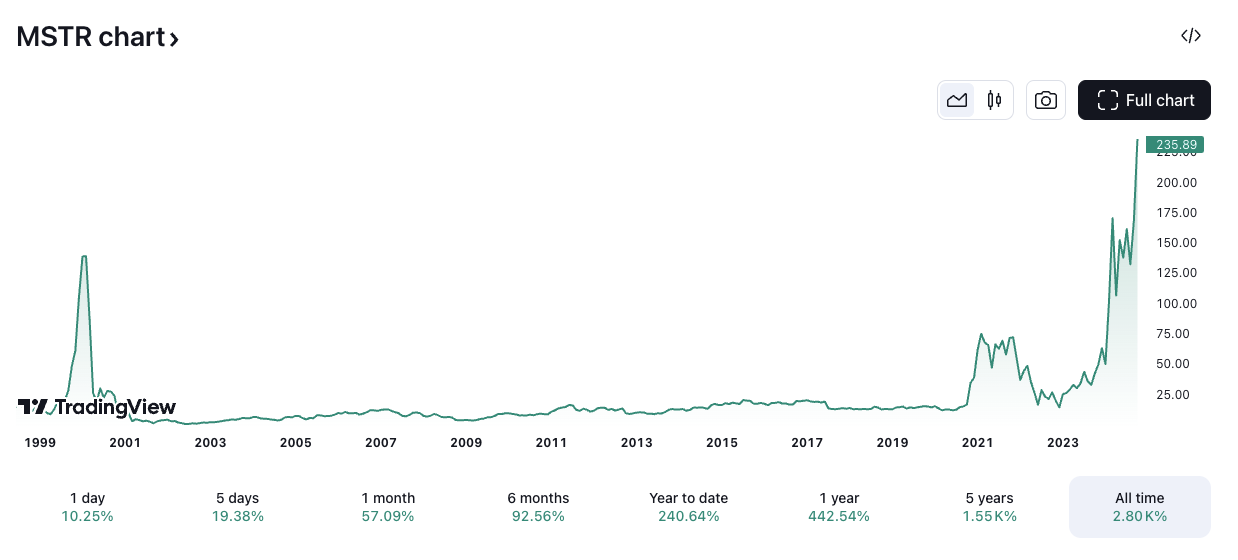MicroStrategy 'highly unlikely' to be forced to sell bitcoin as stock reaches 25-year high, analysts say
Analysts at BitMEX Research argued MicroStrategy is “highly unlikely” to be forced to sell its bitcoin based on the current debt structure, but “anything is possible.”MicroStrategy stock traded at a 25-year high of $235.89 as of Thursday’s close, having gained more than 10% for the day.

Analysts at BitMEX Research argued MicroStrategy is “highly unlikely” to be forced to sell its bitcoin holdings based on its current debt structure. However, given the volatility of the cryptocurrency, “anything is possible,” they said.
The business intelligence firm is the largest corporate holder of bitcoin, with 252,220 BTC , currently valued at over $17 billion, at a total cost of around $9.9 billion.
MicroStrategy’s stock gained more than 10% on Thursday to reach a 25-year high of $235.89 as of market close, according to TradingView. The firm's $43.6 billion market cap trades at a “massive premium” to the net asset value of its underlying bitcoin holdings — somewhat reminiscent of The Grayscale Bitcoin Trust in prior cycles before its conversion to a spot Bitcoin exchange-traded fund, the analysts said.

MSTR/USD price chart. Image: TradingView .
MicroStrategy has been able to leverage premium share issuances to buy more bitcoin and boost book value per share in a so-called “infinite money glitch.” The firm’s five equity offerings since embarking on its bitcoin strategy in 2020 have raised a total of $4.25 billion so far, they noted.
Last week, Benchmark analyst Mark Palmer defended MicroStrategy stock's big premium to its bitcoin holdings, describing it as “intelligent leverage.”
MicroStrategy founder and Executive Chairman Michael Saylor has previously said he has no intention of selling the company’s bitcoin. However, given MicroStrategy’s substantial holdings in the volatile asset and its significant debt levels, some have questioned if the company’s hand could be forced, causing it to sell its bitcoin holdings into the market, leading to a downward price spiral.
No easy answer
The BitMEX Research analysts said there was no easy answer. The bonds come with complex conversion options, allowing bondholders to either convert to MSTR shares or request cash redemption based on conditions like stock performance and bond maturity. Most bonds allow MicroStrategy to redeem for cash if shares trade at a premium, while bondholders may convert to shares if bitcoin prices are strong, making forced bitcoin sales unlikely. Although interest payments could theoretically pressure MicroStrategy, cash flow from its software business should cover these costs without selling bitcoin, even if prices fall, they explained.
Therefore, as MicroStrategy’s bonds are not currently a major part of its capital structure, forced bitcoin sales to meet bond obligations remain unlikely, according to the analysts. Even if bitcoin dropped by a typical bear market 80% to around $15,000 and the company can’t raise more debt, the maturity and bondholder option dates are spread across specific periods from 2027 to 2031, reducing pressure for immediate liquidation, they said.
However, if MicroStrategy’s stock premium over its net asset value shifts to a discount and bond repayments are due, it may become advantageous for shareholders to support bitcoin sales. So, while the stock trades at a premium, there’s minimal incentive to sell bitcoin, but if the debt increases, so does the risk, and the possibility of forced sales in a bitcoin downturn could rise, they warned. “For now, the leverage is low and the liquidation risk is low.”
Disclaimer: The content of this article solely reflects the author's opinion and does not represent the platform in any capacity. This article is not intended to serve as a reference for making investment decisions.
You may also like
New spot margin trading pair — SAHARA/USDT!
SAHARAUSDT now launched for futures trading and trading bots
New spot margin trading pair — H/USDT!
Bitget x BLUM Carnival: Grab a share of 2,635,000 BLUM
